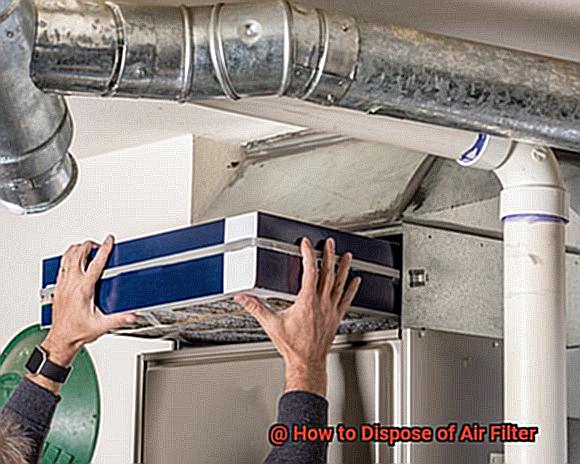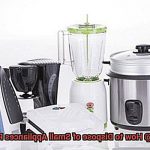Are you one of those who care about the environment and want to reduce waste?
If so, you’re probably aware that proper disposal of items is crucial. But have you ever thought about the air filter in your home or car?
This small item plays a significant role in maintaining the air quality we breathe. However, what happens when it’s time to dispose of them?
Don’t be tempted to toss your old air filter in the trash and forget about it. Did you know that air filters can contain harmful chemicals and contaminants that can pollute our soil and water?
That’s why it’s essential to dispose of them properly. In this blog post, we’ll explore different ways to dispose of air filters while keeping the environment safe.
So, let’s get started now.
What is an Air Filter?
Contents [show]
Air filters are an integral component of our modern world and can be found in a variety of settings, including heating and cooling systems, standalone air purifiers, and even vehicles. They come in different types, each with their unique way of cleaning the air.
Mechanical filters use a physical barrier to trap particles, while electrostatic filters use an electric charge to attract and capture particles. UV filters use ultraviolet light to kill harmful microorganisms.
Maintaining good indoor air quality is crucial for our health and well-being. Over time, air filters can become clogged with dirt, dust, and debris, which can reduce their effectiveness and even lead to poor health outcomes.
To prevent this, it’s recommended that you replace or clean your air filter every three months or as needed based on usage and the type of filter you have. But what should you do with your old air filter?
It’s important to dispose of it properly to avoid harming the environment. Before tossing it in the trash, check with your local waste management facility for specific guidelines on how to dispose of it safely.
Some filters can be recycled or reused, while others may contain hazardous materials that require special handling. In conclusion, understanding what an air filter is and how it works is crucial for keeping the air we breathe clean and healthy.
Local Regulations for Disposing of Hazardous Materials
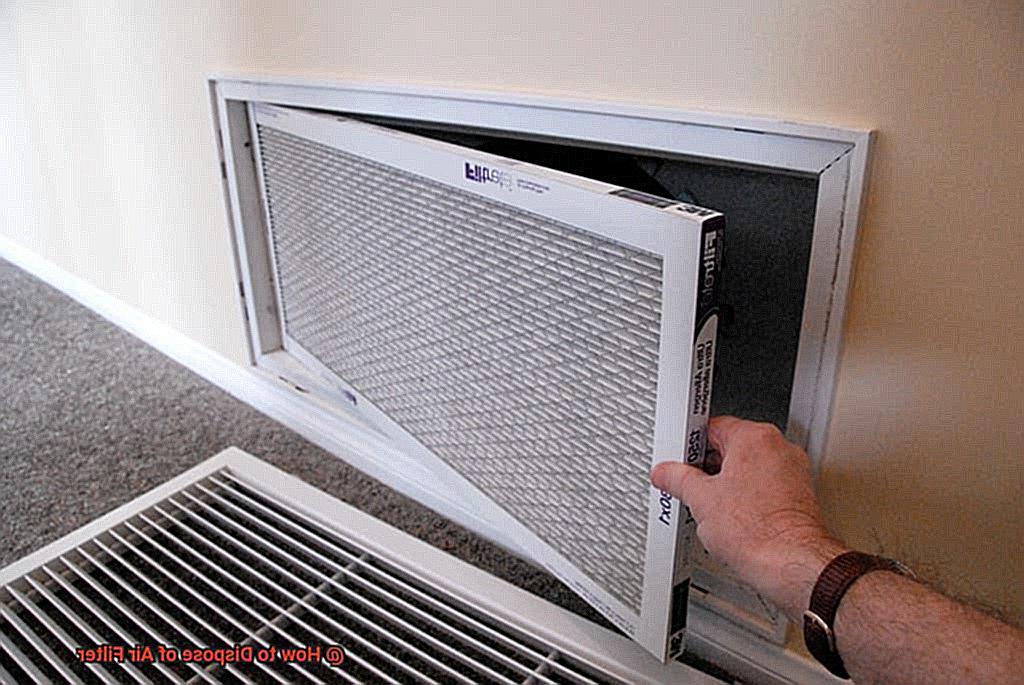
Air filters play a critical role in our daily lives by keeping us healthy and safe from harmful pollutants.
However, when it’s time to dispose of them, we must be mindful of the local regulations for disposing of hazardous materials to protect the environment and ensure their effectiveness. The Environmental Protection Agency has put in place regulations to ensure that hazardous waste is disposed of responsibly and safely.
The Resource Conservation and Recovery Act mandates that hazardous waste is disposed of in an environmentally safe fashion.
Every state has its own set of regulations that must comply with the RCRA, making it essential to research the specific regulations in your area.
In addition to the RCRA, many states have specific regulations for the disposal of air filters. For instance, California mandates that all used air filters be correctly sealed in a plastic bag before disposal.
Other states may require that air filters be disposed of at a specific facility or recycling center. It is crucial to follow these regulations to prevent hazardous materials from contaminating the environment and landfills.
Failing to comply with these guidelines can result in hefty fines and other penalties. Imagine playing Russian Roulette with our environment’s health by not disposing of hazardous materials correctly.
Following local regulations for disposing of hazardous materials is similar to wearing a mask during a pandemic – it may seem inconvenient at times, but it is essential for everyone’s safety and well-being.
To sum up, it is vital to research and follow the local regulations for disposing of air filters and other hazardous materials.
Recycling Your Air Filter
Air filters are essential for maintaining clean and healthy indoor air quality.
However, when it comes time to replace them, it’s important to dispose of them properly. Recycling your air filter is one way to do this in an eco-friendly manner.
Before you start recycling your air filter, it’s crucial to determine whether or not it is recyclable. If your filter is made of cardboard or paper, then you’re in luck.
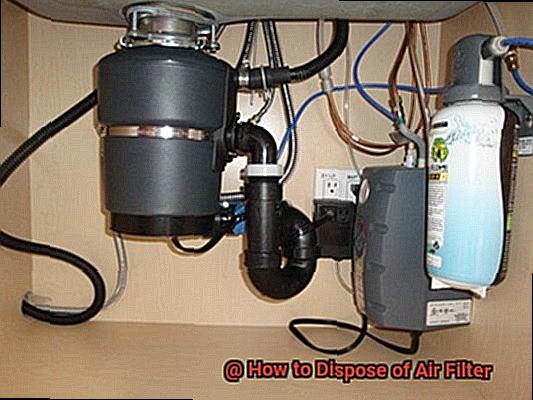
These materials can be recycled with your regular paper recycling. However, if your air filter is made of fiberglass or has a metal frame, it cannot be recycled and should be disposed of in the regular trash.
Assuming you have a recyclable air filter, there are a few steps you should take before recycling it. First, remove the cardboard frame from the filter material.
Then, remove any foam gaskets or metal clips as these materials cannot be recycled and must be disposed of in the regular trash. Once you’ve separated the recyclable materials from the non-recyclable ones, you can recycle the cardboard frame and filter material with your regular paper recycling.
Always check with your local recycling center first to ensure they accept these materials. But what if your air filter is not recyclable?
It’s vital to dispose of it properly to prevent harmful chemicals from being released into the environment. Do not burn or incinerate your air filter.
Instead, wrap the filter in a plastic bag and dispose of it in the regular trash. In conclusion, recycling your air filter is an easy way to reduce waste and help protect our environment.
Throwing Away Your Air Filter
First, handling your old air filter with care is crucial. It may contain a ton of dust, dirt, and other debris that can be harmful if inhaled.
So, before you get down to business, make sure to wear gloves and a mask if necessary. Now let’s dive into the two primary options for disposing of your air filter: throwing it away in the garbage or recycling it.
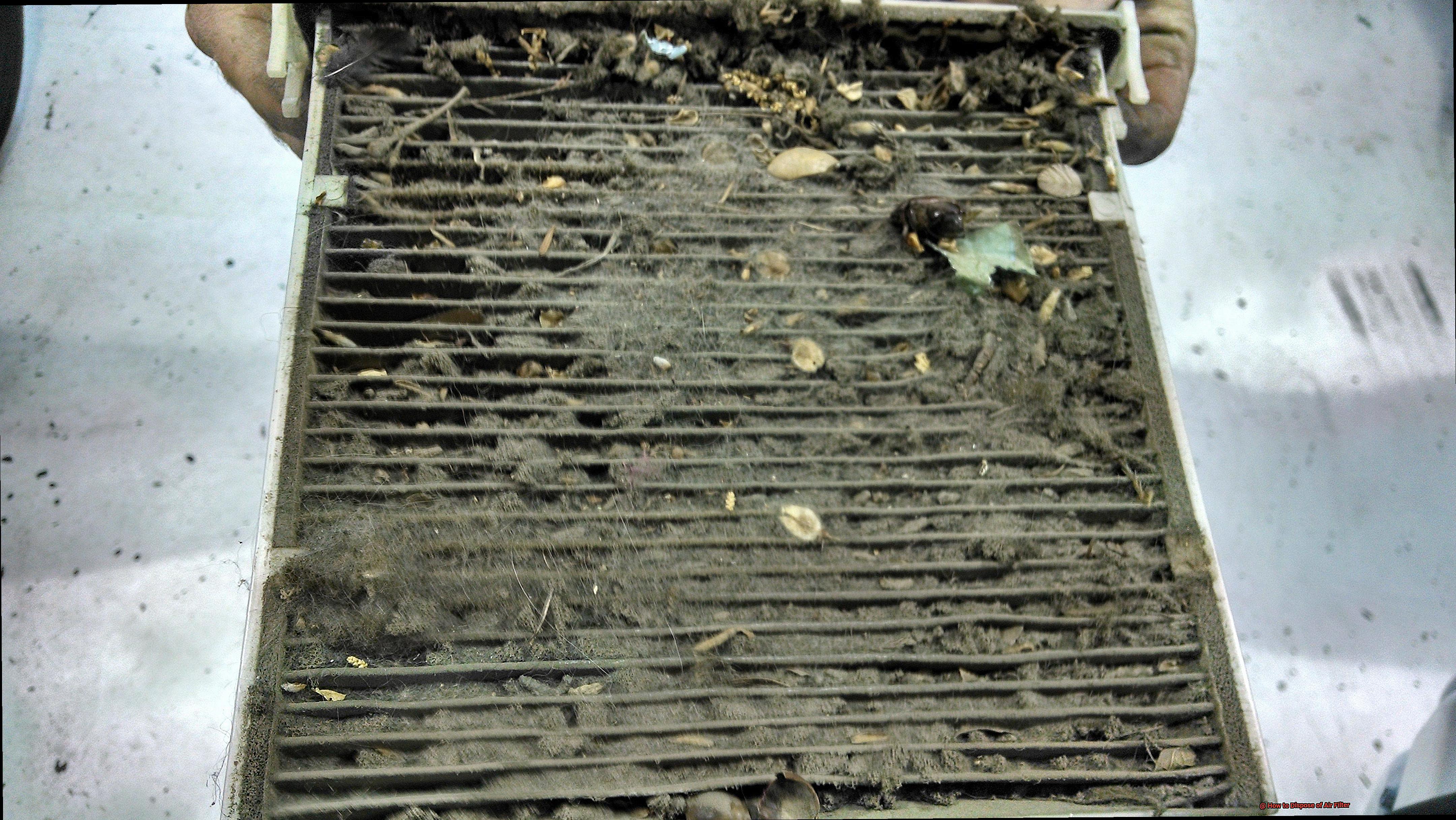
If you decide to toss it in the bin, make sure to check with your local waste management authority first. Some areas have specific regulations for disposing of air filters, and failing to follow them could result in fines or other penalties.
On the other hand, recycling your air filter is always a fantastic eco-friendly option if possible. Many air filters are made from recyclable materials such as paper and metal.
To recycle your old air filter, all you need to do is remove any non-recyclable parts (such as plastic or foam) and place the remaining materials into your recycling bin. If you’re feeling unsure about how to dispose of your air filter safely or have any concerns about handling it, don’t hesitate to consult with a professional.
Your HVAC technician or local waste management authority can provide guidance on the best way to dispose of your used air filter.
Composting Your Air Filter
It’s important to note that only air filters made of natural materials such as cotton or wool are suitable for composting. Synthetic air filters made of plastic should not be composted.
Composting your air filter is easy and requires just a few simple steps. First, remove any metal parts or frames from the filter.
Then, cut the filter into small pieces using scissors or a knife. The smaller the pieces, the faster they will decompose.
Add the pieces to your compost bin along with other organic materials such as food scraps, yard waste, and leaves. To ensure that your compost pile is properly balanced, it’s crucial to include a mix of green (nitrogen-rich) and brown (carbon-rich) materials.
Air filters are considered brown materials and should be balanced with green materials such as grass clippings or vegetable scraps. Keep the compost pile moist by regularly watering it and turning it over every few weeks to aerate it.
This will help speed up the decomposition process. After several months, the compost will be ready to use in your garden or flower beds.
Remember to wear gloves and a mask when handling your old air filter and always consult with local professionals if you have any doubts about proper disposal.
Manufacturer Programs for Recycling or Disposing of Air Filters
Many manufacturers offer recycling or disposal programs that can make the process of disposing of air filters easier and more eco-friendly. Each manufacturer’s program may differ, but they generally involve sending the used filter back to the company for proper disposal or recycling.
Some companies even provide prepaid shipping labels so that you can send your filter back without any added costs. If you’re lucky, some manufacturers may have local drop-off locations where you can bring your used filters for recycling.
It’s important to note that not all manufacturers offer these programs, and some may have specific requirements or restrictions. Be sure to check with your specific brand to see if they have a program in place for their air filters.
You can usually find information about these programs on their website or by contacting their customer service department.
By using manufacturer recycling or disposal programs, you can ensure that your used air filters are disposed of properly and don’t end up polluting our planet.
If you want to take an extra step towards sustainability, consider transforming your old air filter into nutrient-rich compost for your garden.
Simply cut it into small pieces and add it to your compost bin along with other organic materials. Remember to balance the brown air filter with green materials like grass clippings or vegetable scraps, regularly watering and turning the pile to speed up decomposition.
Conclusion
In conclusion, it’s essential to dispose of air filters properly to maintain good indoor air quality and protect the environment.
Air filters can contain harmful chemicals and contaminants that can pollute our soil and water if not disposed of correctly. Fortunately, there are eco-friendly ways to dispose of air filters.
Before disposing of an air filter, you should determine whether it is recyclable or not. If it is made of cardboard or paper, you can recycle it with regular paper recycling.
However, if it is made of fiberglass or has a metal frame, it cannot be recycled and should go in the regular trash. Composting your air filter is another eco-friendly option if it’s made of natural materials like cotton or wool.
Synthetic air filters made of plastic should not be composted. Many manufacturers offer recycling or disposal programs for their air filters, making the process easier and more sustainable.
Always wear gloves and a mask when handling old air filters and consult with local professionals if you have any doubts about proper disposal.
